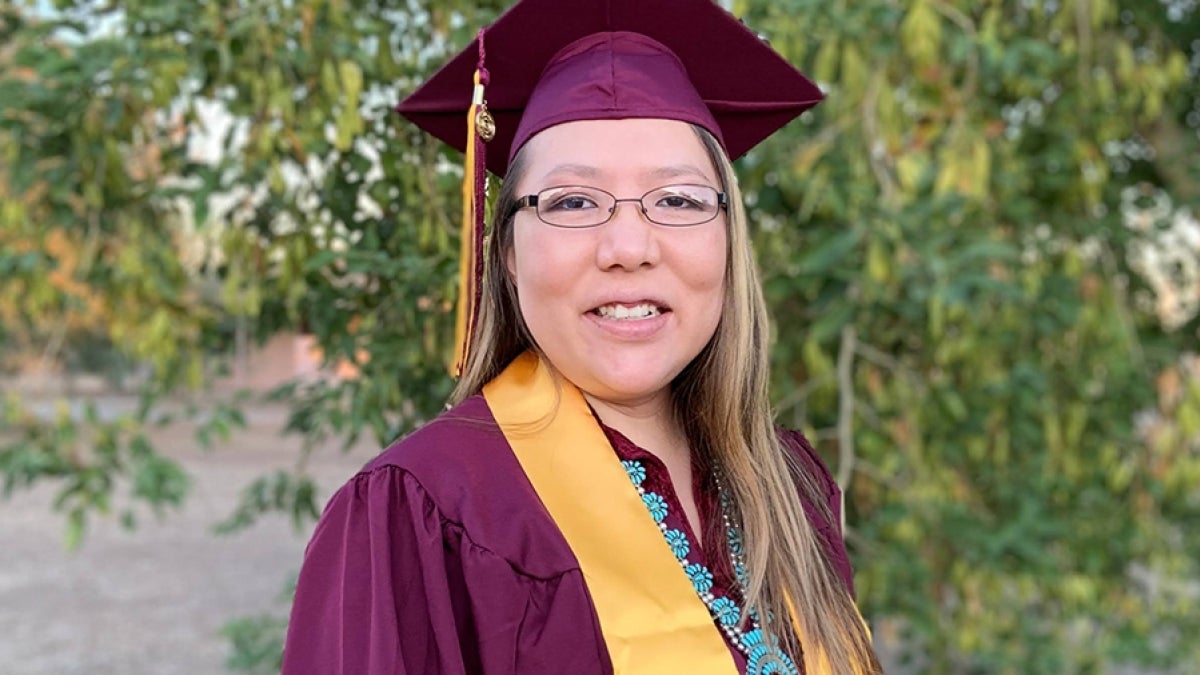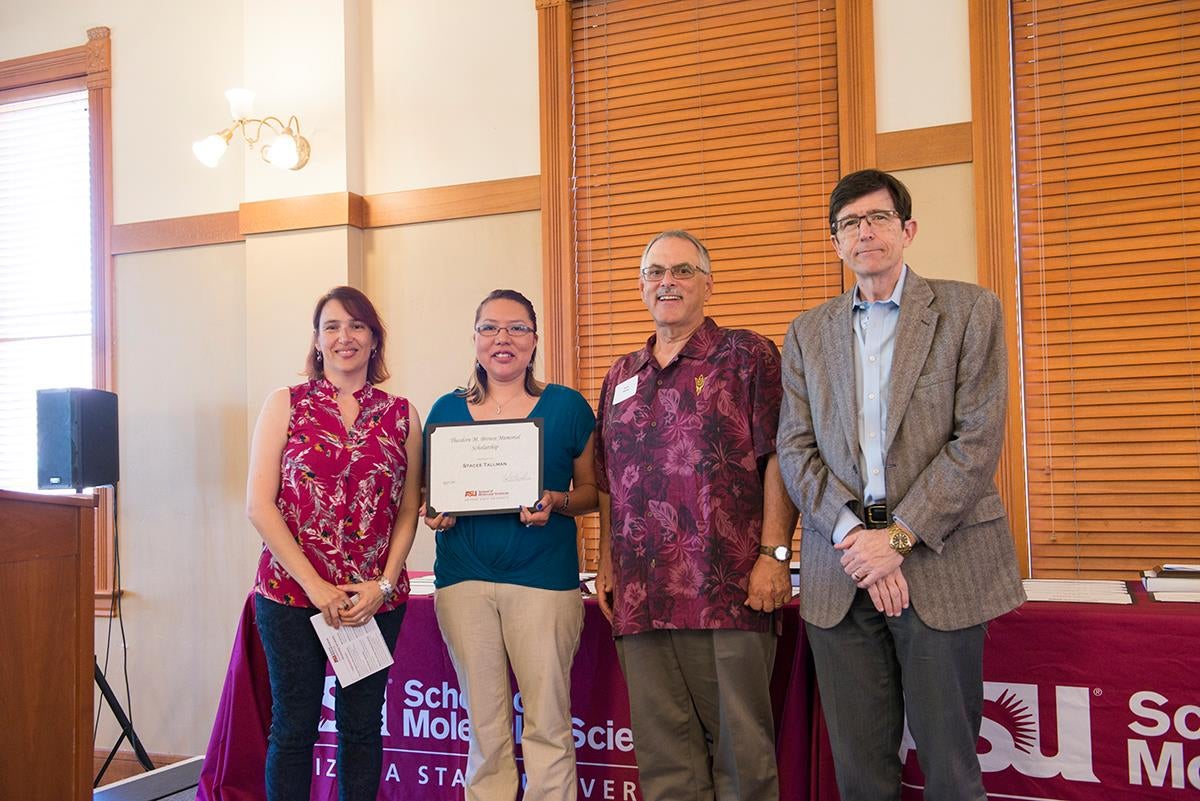Aid to Navajo Nation is aim of talented biochemistry graduate

Stacee Tallman is graduating in December with a Bachelor of Science in biochemistry from the School of Molecular Sciences at ASU.
Editor's note: This story is part of a series of profiles of notable fall 2020 graduates.
Inspired by her aunt Nonita Adair, who was the first Navajo woman to earn a Doctor of Pharmacy degree in Arizona (1992), Stacee Tallman will graduate in December with a Bachelor of Science in biochemistry from the School of Molecular Sciences at ASU.
Tallman transferred to ASU from Diné College, a public tribal two-year college in Tuba City, Arizona, serving the 27,000-square-mile Navajo Nation. Moving with her husband and kids to Phoenix to continue her education wasn’t easy, but Tallman was extremely motivated.
American Indian students make up less than 1% of all college students in the U.S., according to the National Center for Education Statistics, and only about 13% of all Native Americans have a college degree. Tallman's ambition is to help change this statistic in a very positive way.
Tallman also recognizes that the Navajo Nation has been hit extremely hard by COVID-19 and wants to do anything she can to help. As a result, she is participating in one of the COVID-19 vaccine trials. She will also pursue a Doctor of Pharmacy at either Midwestern University or the University of Arizona with the aim of returning to her hometown of Tuba City to fill a pharmacist position at Tuba City Regional Health Care.
Congratulations are also due to Tallman for being awarded the 2019 Ted Brown Memorial Chemistry Scholarship. The scholarship is privately funded and was established in honor of Emeritus Professor Ted Brown. It is awarded annually to a first-generation undergraduate student. Preference is given to Native American students who have an affiliation with a federally recognized or state-recognized tribe.

From left to right: Marcia Levitus, Stacee Tallman, David Rasely and Neal Woodbury at the 2019 SMS Student Award Ceremony. Photo by Mary Zhu
Question: What was your “aha” moment when you realized you wanted to study the field you majored in?
Answer: I didn't really have an "aha" moment. I have always dreamed of becoming a pharmacist. I transferred to ASU from Diné College, after I progressed as much as I could in completing the prerequisites for pharmacy school. You see, they don't have the staff to teach physics, or general chemistry, or organic chemistry, or any upper division science courses in Tuba City. I was fortunate that before I transferred they took on a new faculty member, and I was able to get anatomy and physiology checked off my list. So, I moved my husband and kids to Phoenix to continue my education. I chose ASU, because although NAU was a lot closer to home, tuition was a lot more. ASU was the best, cost-wise. And when I sat with an adviser, biochemistry was the best major that took care of the rest of the prerequisites that I needed for pharmacy school. At the time, I was just planning on finishing those classes that I needed, but when I had finished and saw how much progress I made on my DARS — the tiniest sliver of pie was left on the pie chart — I decided to finish and get my degree. So maybe that was my "aha" moment.
Q: What’s the best piece of advice you’d give to those still in school?
A: Advice I'd like to give to current students is, stay on top of school work! Do not procrastinate, homework comes first, use a planner, plan your semester, go to class, and when registering for new classes for an upcoming semester use “Rate my Professor."
Q: What was your favorite spot on campus, whether for studying, meeting friends or just thinking about life?
A: My favorite spot to sit and work while waiting for my next class would definitely be the second floor of Wexler on the east side, the outdoor balcony. It's very refreshing there.
Q: What are your plans after graduation?
A: After graduation, I plan on applying to both University of Arizona's and Midwestern University's pharmacy programs. The ideal school would be the University of Arizona. I would love to follow in the footsteps of my aunt Nonita Adair, who graduated class of 1992 and was the first Navajo Woman to get a Doctor of Pharmacy degree.
Q: If someone gave you $40 million to solve one problem on our planet, what would you tackle?
A: If I was given $40 million although this would not be near enough to fix any one problem on our planet, I would use the money for COVID-19. I think at this point everyone is sick of this pandemic. This has become a big problem we are all facing. I miss my family, I miss our gatherings. My oldest son was robbed of his senior prom, and his high school graduation. Our Navajo Nation was hit hard, and now we have declared we are in our second wave, and it's not right to take a family member to a hospital, and they get taken, and you can't be with them, no updates. Then you just get a call that they have passed. You don't get to say your goodbyes. It's heartbreaking. This is why I signed up to be a participant in one of the COVID-19 vaccine trials. My hope is to get things back to normal soon.
More Science and technology

ASU postdoctoral researcher leads initiative to support graduate student mental health
Olivia Davis had firsthand experience with anxiety and OCD before she entered grad school. Then, during the pandemic and as a…

ASU graduate student researching interplay between family dynamics, ADHD
The symptoms of attention deficit hyperactivity disorder (ADHD) — which include daydreaming, making careless mistakes or taking…

Will this antibiotic work? ASU scientists develop rapid bacterial tests
Bacteria multiply at an astonishing rate, sometimes doubling in number in under four minutes. Imagine a doctor faced with a…